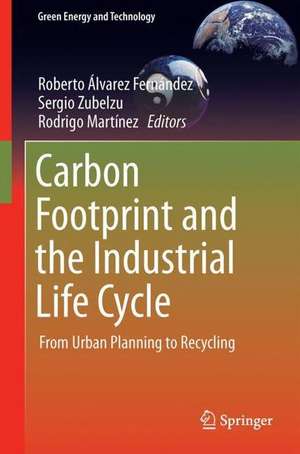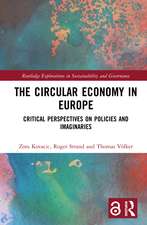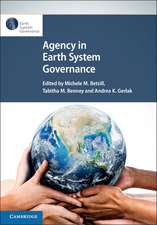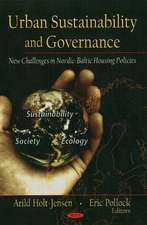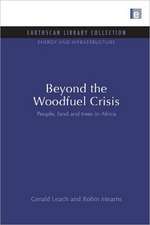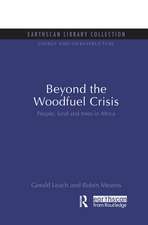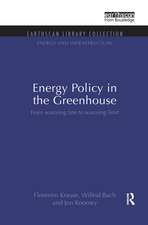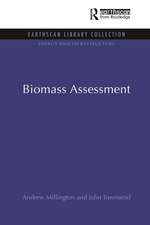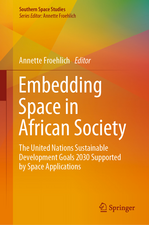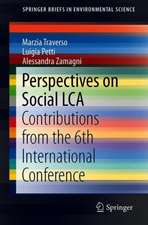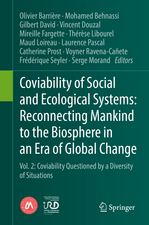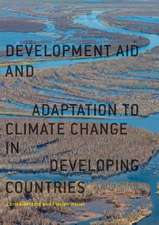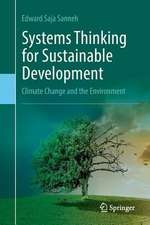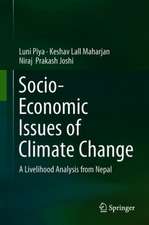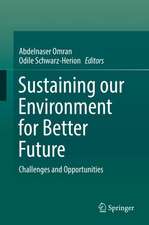Carbon Footprint and the Industrial Life Cycle: From Urban Planning to Recycling: Green Energy and Technology
Editat de Roberto Álvarez Fernández, Sergio Zubelzu, Rodrigo Martínezen Limba Engleză Hardback – 8 iun 2017
| Toate formatele și edițiile | Preț | Express |
|---|---|---|
| Paperback (1) | 1120.50 lei 6-8 săpt. | |
| Springer International Publishing – aug 2018 | 1120.50 lei 6-8 săpt. | |
| Hardback (1) | 1126.84 lei 6-8 săpt. | |
| Springer International Publishing – 8 iun 2017 | 1126.84 lei 6-8 săpt. |
Din seria Green Energy and Technology
- 18%
 Preț: 943.43 lei
Preț: 943.43 lei - 20%
 Preț: 629.52 lei
Preț: 629.52 lei - 18%
 Preț: 1124.92 lei
Preț: 1124.92 lei - 18%
 Preț: 947.35 lei
Preț: 947.35 lei - 15%
 Preț: 655.92 lei
Preț: 655.92 lei - 18%
 Preț: 957.62 lei
Preț: 957.62 lei - 18%
 Preț: 789.52 lei
Preț: 789.52 lei - 17%
 Preț: 464.56 lei
Preț: 464.56 lei - 15%
 Preț: 645.79 lei
Preț: 645.79 lei - 18%
 Preț: 903.93 lei
Preț: 903.93 lei - 24%
 Preț: 1322.09 lei
Preț: 1322.09 lei - 18%
 Preț: 890.54 lei
Preț: 890.54 lei - 18%
 Preț: 1115.46 lei
Preț: 1115.46 lei - 18%
 Preț: 1117.03 lei
Preț: 1117.03 lei - 18%
 Preț: 949.73 lei
Preț: 949.73 lei - 18%
 Preț: 892.11 lei
Preț: 892.11 lei - 15%
 Preț: 648.24 lei
Preț: 648.24 lei - 18%
 Preț: 997.09 lei
Preț: 997.09 lei - 15%
 Preț: 579.81 lei
Preț: 579.81 lei - 18%
 Preț: 1123.15 lei
Preț: 1123.15 lei - 18%
 Preț: 961.41 lei
Preț: 961.41 lei - 17%
 Preț: 490.23 lei
Preț: 490.23 lei - 18%
 Preț: 904.60 lei
Preț: 904.60 lei - 15%
 Preț: 643.34 lei
Preț: 643.34 lei -
 Preț: 287.91 lei
Preț: 287.91 lei - 24%
 Preț: 634.05 lei
Preț: 634.05 lei -
 Preț: 379.40 lei
Preț: 379.40 lei - 18%
 Preț: 783.20 lei
Preț: 783.20 lei - 18%
 Preț: 1394.84 lei
Preț: 1394.84 lei - 18%
 Preț: 1691.57 lei
Preț: 1691.57 lei - 18%
 Preț: 1112.48 lei
Preț: 1112.48 lei - 15%
 Preț: 592.61 lei
Preț: 592.61 lei - 18%
 Preț: 952.09 lei
Preț: 952.09 lei - 18%
 Preț: 944.19 lei
Preț: 944.19 lei - 18%
 Preț: 891.33 lei
Preț: 891.33 lei - 18%
 Preț: 1252.44 lei
Preț: 1252.44 lei - 18%
 Preț: 789.52 lei
Preț: 789.52 lei - 20%
 Preț: 566.30 lei
Preț: 566.30 lei - 18%
 Preț: 1113.71 lei
Preț: 1113.71 lei - 18%
 Preț: 1114.24 lei
Preț: 1114.24 lei - 24%
 Preț: 590.60 lei
Preț: 590.60 lei - 20%
 Preț: 567.50 lei
Preț: 567.50 lei - 24%
 Preț: 907.50 lei
Preț: 907.50 lei - 18%
 Preț: 952.89 lei
Preț: 952.89 lei - 18%
 Preț: 952.89 lei
Preț: 952.89 lei - 18%
 Preț: 950.52 lei
Preț: 950.52 lei
Preț: 1126.84 lei
Preț vechi: 1374.19 lei
-18% Nou
Puncte Express: 1690
Preț estimativ în valută:
215.62€ • 225.93$ • 178.25£
215.62€ • 225.93$ • 178.25£
Carte tipărită la comandă
Livrare economică 11-25 aprilie
Preluare comenzi: 021 569.72.76
Specificații
ISBN-13: 9783319549835
ISBN-10: 3319549839
Pagini: 550
Ilustrații: XII, 550 p. 202 illus.
Dimensiuni: 155 x 235 mm
Greutate: 0.96 kg
Ediția:1st ed. 2017
Editura: Springer International Publishing
Colecția Springer
Seria Green Energy and Technology
Locul publicării:Cham, Switzerland
ISBN-10: 3319549839
Pagini: 550
Ilustrații: XII, 550 p. 202 illus.
Dimensiuni: 155 x 235 mm
Greutate: 0.96 kg
Ediția:1st ed. 2017
Editura: Springer International Publishing
Colecția Springer
Seria Green Energy and Technology
Locul publicării:Cham, Switzerland
Cuprins
Introduction: Sustainability and urban planning.- 2 Methodology for calculating industrial carbon footprints.- 3 Industrial activity categories and urban master plan.- 4 Characterization of industrial GHG emission sources in an urban planning context.- 5 Carbon footprint calculation and industrial urban planning procedures.- 5.1 Potable water infrastructure.- 5.2 Waste water management infrastructure.- 5.3 Electricity supply infrastructure.- 5.4 Gas supply infrastructure.- 5.5 Waste management infrastructure.- 5.6 Transport infrastructure. - 6 Metrics for the Sustainability of Infrastructure Projects.- 7 Modelling a Low-Carbon City: Eco-City and Eco-Planning.- Tools for Urban Sustainability Designers.- 9 Urban planning policy implications.- 10 Case Study.- 11 Case study.- 12 Conclusions and further recommendations.
Notă biografică
Roberto Álvarez is an electrical engineer with a PhD in Manufacturing Process Engineering. He currently heads the Mechanical Engineering Department at Nebrija University, Madrid, Spain. He has over fourteen years of experience as a lecturer in electric machines, manufacturing processes, quality systems and lean management, environmental science, and electric vehicles, and serves as a consultant on these topics for various companies in Spain (Hyundai, CNH2, Carrefour). He is the author of numerous articles and contributions to scientific conferences related to lean manufacturing, energy, and greenhouse gas emissions. High-profile journal outlets include Energy Policy, Energy, Land Use Policy, the Journal of Automobile Engineering, and the Journal of Cleaner Production. He is also a reviewer for a number of journals in the area. He has coauthored two books: “Mathematics for Engineers” (Ed. Paraninfo) and “Legal Architecture” (Ed. Munilla).
Rodrigo Martínez is an industrial design engineer and has a PhD in Industrial Design. He currently heads the Industrial Design Department at Nebrija University, Madrid, Spain, and has broad experience in the development of design projects as a lecturer in industrial design, design, and environment, or eco-design, projects. He has developed and coordinated projects with several companies and agencies such as Ecoembes, Lékué, Ikea, Retecork, or Finsa. He is the author of numerous papers and contributions related to the methodological process of design, including the importance of a lifecycle in the conception of products and solutions. He has also served as a reviewer for various journals in this area and collaborates with the main design agencies in Spain, such as Red-Aede and ADI-FAD. He is the editor of Experimenta Magazine, and is also editing a book on the importance of the identity in the product design process.
Sergio Zubelzu is an agricultural engineer and has a PhD in Environment and Sustainable Development. He is currently an assistant professor at the Technical University of Madrid and has over ten years of experience as a lecturer in statistics and operations research and as a consultant hydraulic engineer. His research activities mainly concern the methodologies to simulate physical and environmental phenomena. He has authored and coauthored several articles, contributions to scientific congresses and books.
Rodrigo Martínez is an industrial design engineer and has a PhD in Industrial Design. He currently heads the Industrial Design Department at Nebrija University, Madrid, Spain, and has broad experience in the development of design projects as a lecturer in industrial design, design, and environment, or eco-design, projects. He has developed and coordinated projects with several companies and agencies such as Ecoembes, Lékué, Ikea, Retecork, or Finsa. He is the author of numerous papers and contributions related to the methodological process of design, including the importance of a lifecycle in the conception of products and solutions. He has also served as a reviewer for various journals in this area and collaborates with the main design agencies in Spain, such as Red-Aede and ADI-FAD. He is the editor of Experimenta Magazine, and is also editing a book on the importance of the identity in the product design process.
Sergio Zubelzu is an agricultural engineer and has a PhD in Environment and Sustainable Development. He is currently an assistant professor at the Technical University of Madrid and has over ten years of experience as a lecturer in statistics and operations research and as a consultant hydraulic engineer. His research activities mainly concern the methodologies to simulate physical and environmental phenomena. He has authored and coauthored several articles, contributions to scientific congresses and books.
Textul de pe ultima copertă
This book analyzes the relationship between large-scale industrial activity and the carbon footprint, and provides a theoretical framework and tools to calculate the carbon footprint of industrial activities at every stage of their life cycles, including urban-planning master plans, recycling activities, project and building stages as well as managing and manufacturing. Discussing the main preventative and corrective measures that can be utilized, it includes case studies, reports on technological developments and examples of successful policies to provide inspiration to readers. This book collects the contributions of authors from four continents, in order to analyze from as many as possible points of view and using many different approaches, the problem of sustainability in today’s globalized world.
Caracteristici
Provides a global tool to analyze the carbon footprint of industrial activities at every stage Presents the main preventative measures that can be utilized Examines technological developments in the industry Includes supplementary material: sn.pub/extras
